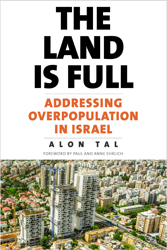Join a community of readers who are committed to Jewish stories
Sign up for JBC’s Nu Reads, a curated selection of Jewish books delivered straight to your door!
Earlier this week, The Land Is Full author Alon Tal explained why Israel’s stunning population growth is no cause for celebration. He is guest blogging here all week as part of the Visiting Scribe series on The ProsenPeople.
For most of Israel’s history it was impossible to conduct a rational conversation about ensuring a sustainable and stable population. There were three fundamental reasons for this:
 The first was the Holocaust. The Jewish people had lost more than a third of its numbers and it would take decades to replace them. The second reason involved the birthrate of Israeli Arabs: not only did Israel’s Arab citizens have the highest birth rate in the world during some years — peaking at 9.2 children per family in 1965 — but Arab leaders openly declared their intention of defeating Israel demographically. Israel was in a battle for survival and large Jewish families were part of the “war effort,” and talking about long-term social and ecological implications seemed a bizarre affectation. Finally, hundreds of thousands of Jews from around the world faced persecution or economic hardship and were interested in moving to Israel. There was no room for questioning Israel’s raison d’etre: ingathering persecuted Jewish exiles and ensuring an open door policy for Jews everywhere through the law of return.
The first was the Holocaust. The Jewish people had lost more than a third of its numbers and it would take decades to replace them. The second reason involved the birthrate of Israeli Arabs: not only did Israel’s Arab citizens have the highest birth rate in the world during some years — peaking at 9.2 children per family in 1965 — but Arab leaders openly declared their intention of defeating Israel demographically. Israel was in a battle for survival and large Jewish families were part of the “war effort,” and talking about long-term social and ecological implications seemed a bizarre affectation. Finally, hundreds of thousands of Jews from around the world faced persecution or economic hardship and were interested in moving to Israel. There was no room for questioning Israel’s raison d’etre: ingathering persecuted Jewish exiles and ensuring an open door policy for Jews everywhere through the law of return.
One of the central points of my new book The Land is Full, Addressing Overpopulation in Israel is that none of these three conditions are valid today. It is finally time for a frank discussion about how many people the country can hold and, more importantly, how many people it should hold.
The world’s Jewish population in 2016 is roughly 16 million people. This is slightly less than the estimated 16.7 million Jews living before the unspeakably horrible losses suffered during the Holocaust. Yet the momentum created by Israel’s young population and growing life expectancy means that the number of Jews will reach 20 million worldwide within a generation. For those who saw replacement of the six million as a sacred national duty, it is time to move on.
Additionally, the astonishing drop in Arab Israeli fertility during the past two decades has changed the political and demographic dynamics in Israel completely. Already, Israel’s Druze and Christian communities, who not long ago averaged 6 and 7 children per family, have birth rates that hover around 2.1 replacement levels. Israel’s Muslim citizens have seen a comparable drop. Indeed, were it not for the Bedouin communities in the Negev, theirs would be lower than Israel’s Jewish birth rates. There is a profound gap between the nationalistic, pro-natal rhetoric of Israeli Arab leaders and the practical aspirations of Israel’s Arab citizens to reach a better quality of life and improve the opportunities for their children. An extraordinary rise in education, especially among Arab women, has produced the same result that it has over the world: When given reproductive choice and autonomy, women choose to have smaller families.
Finally, the critical masses of Jews who immigrated to Israel faced unpleasant lives in their native lands and sought a better life. There are no significant communities facing such hardships today. Even during the recent outbreaks of French antisemitism, only 7,000 French Jews moved to Israel in 2015 — and history teaches that many of them will leave. (A greater number moved to Montreal, Miami, and London.)
All told, Israel’s present net immigration balance is neutral. On the deficit side of the ledger, since 1990 on average 22,000 Israelis leave the country each year; on the plus side 26,000 Jews immigrated to Israel on average each year in the past decade. The immigration-emigration balance in Israel is stabilizing, and any gains or losses are trivial in relation to overall population size.
From the perspective of sustainability, this is an ideal situation. Sustainable growth, after all, is an oxymoron; stability is the ideal. If Israel’s paramount mission is to serve as a sanctuary for Jews around the world, present dynamics should in no way be considered a failure: the present equilibrium is a triumph. For sixty years, Israel served as a critical haven for persecuted Jews or for Jews facing economic privation. Despite occasional mistakes, the country carried out this assignment with distinction. Israel was a land of opportunity for immigrants. Veteran Israeli taxpayers, along with generous Jews from around the world, willingly footed the bill for associated absorption costs.
 But this stage is now over. It is possible to move to the next phase in the Zionist evolution, which focuses on building an Israeli society that is a paragon of creativity, culture, tolerance, justice, and sustainability. It is also time to embrace a new, more mature relationship between Israel and the Jewish world, a relationship of mutual admiration and respect. There is no reason why Israel should not embrace a more deferential approach to North American Jews and to the other remarkable Jewish communities flourishing today around the world. Israel needs to seek a strategy to ensure that its population stabilizes as quickly as possible. It is time to focus on the ecological integrity of the Promised Land while creating an equitable and enlightened society that can indeed become a Light unto the Nations.
But this stage is now over. It is possible to move to the next phase in the Zionist evolution, which focuses on building an Israeli society that is a paragon of creativity, culture, tolerance, justice, and sustainability. It is also time to embrace a new, more mature relationship between Israel and the Jewish world, a relationship of mutual admiration and respect. There is no reason why Israel should not embrace a more deferential approach to North American Jews and to the other remarkable Jewish communities flourishing today around the world. Israel needs to seek a strategy to ensure that its population stabilizes as quickly as possible. It is time to focus on the ecological integrity of the Promised Land while creating an equitable and enlightened society that can indeed become a Light unto the Nations.
Ben Gurion University professor Alon Tal was founding director of the Israel Union for Environmental Defense, Israel’s preeminent ecological advocacy organization, and the Arava Institute for Environmental Studies, a Middle Eastern academic program. A member of the JNF-KKL board for over a decade, from 2010 to 2013 he chaired Israel’s Green Party.
Related Content:
Ben Gurion University professor Alon Tal was founding director of the Israel Union for Environmental Defense, Israel’s preeminent ecological advocacy organization, and the Arava Institute for Environmental Studies, a Middle Eastern academic program. A member of the JNF-KKL board for over a decade, from 2010 to 2013 he chaired Israel’s Green Party. Haaretz has called him “Israel’s most effective environmental leader.”